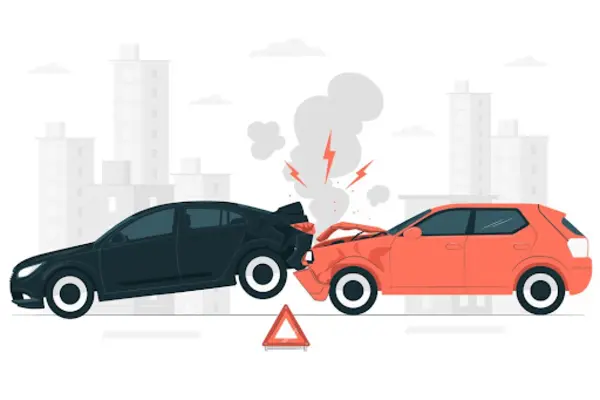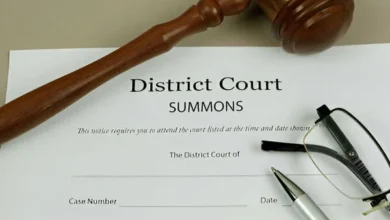What To Do If You Get Injured in an Auto Accident

No one gets behind the wheel thinking they might get into an accident, but it occurs more often than you’d think. According to the National Highway Traffic Safety Administration, nearly 6 million car accidents occur in the United States every year, at an average of about 16,500 each day.
Overspeeding, fatigued driving, and distracted driving are all common causes of car accidents, leading to physical, emotional, and financial strains. The situation becomes even worse when you realize the other driver wasn’t taking the necessary steps for safe driving and caused the accident.
During such stressful situations, knowing what to do makes a world of difference. Here are some steps you should take if you’ve been involved and hurt in an auto accident:
Stay Calm and Check for Injuries
As obvious as it sounds, the first thing you need to do is stay calm. This allows for clearer thinking and better decision-making and prevents the situation from escalating. Staying calm is critical for your safety and the safety of others, be it other passengers or drivers.
To let other drivers know when an accident has occurred, turn on your hazard lights. If at all possible, pull over to a safe spot and remove your vehicle off the road.
The next step is checking yourself for injuries. Look for visible injuries like cuts, bruises, and lacerations. Gently move your limbs to see if you experience any pain or discomfort. Check your passenger and ask if they’re feeling dizziness, nausea, or pain.
Seek Medical Care
After being in a car accident, it is imperative that you always get medical attention. Remember that when you get into an accident, your body’s flight-or-fight response is activated. You experience a surge of adrenaline, which dampens the pain response and releases endorphins. Consequently, you may not experience any kind of pain or discomfort.
Even if you feel fine or there are no visible injuries, there could be underlying issues, such as a concussion or internal bleeding. Moreover, symptoms like neck pain, tingling, weakness, and muscle spasms may appear over the next few hours and even days.
Other common medical injuries due to an auto accident include:
- Fractures
- Spinal cord injuries
- Nerve damage
- Chronic pain
- Mobility issues
Seek complete body medical evaluation as soon as possible. Find a doctor or urgent care center close to you to get a diagnosis, treatment, and prescription. Seeking immediate medical care is also necessary for filing an insurance claim or personal injury lawsuit, as it can help strengthen your case.
Call the Local Authorities
If the accident is an emergency and you or another person is suffering from severe injuries, call 911 and follow instructions.
Please contact the authorities in your area if this is not an immediate danger. When the authorities reach the scene, they will document the accident. This report will include:
- Witness statements
- Initial assessment of the fault
- Details of the incident
The official accident report is critical for protecting your rights in case of legal disputes. Moreover, in most U.S. indicates that reporting accidents is a legal requirement. Calling law enforcement is critical for ensuring legal compliance.
Exchange Information
Next, exchange information with the other car driver. Collect all the data you can, including:
- Names
- Driver’s license number
- The Vehicle Identification Number (VIN)
- Car make and model
- Name and address of the other person’s insurance company
Without the other motorist’s information, you cannot file a claim with your insurance company to seek compensation for car damages, medical bills, and loss of wage. If the other driver showcased gross negligence, you can file for punitive damages.
A competent accident attorney can explain the full extent of potential damages you can seek. If you’re living in Albany, consider working with an Albany auto accident lawyer to understand specific U.S. and select the most appropriate response based on local, state, and federal regulations.
Gather Evidence
Gathering evidence after being involved in a car accident is crucial for establishing fault and supporting your claim. Here’s what you should do:
- Take clear photos of the exact location of the accident.
- Take pictures of your car to show vehicle damage, including skid marks and debris.
- Take videos of the scene.
- Note any relevant details, such as the name of the street or nearest landmarks.
- Check for security cameras. If surveillance cameras are present, ask local authorities for the footage later on.
You should also gather:
- Official police incident report
- Witness testimonies
- Medical reports, including initial assessment report, prescription records, and bills
- Correspondence with insurance companies
To prove the amount of losses and to establish liability, evidence is crucial.
Call Your Insurance Company
Notify your insurance provider of the collision. It does not matter if you are partially to blame for your vehicle accident; you can still seek compensation. Your recovery will be reduced in proportion to the percentage of fault that is assigned to you.
Informing your insurance company is also critical for a no-fault claim, also known as Personal Injury Protection (PIP) coverage. Uninsured motorist coverage pays for fundamental economic losses.
Hire an Auto Accident Lawyer
Whether you’re seeking compensation from your insurance provider or filing a lawsuit against a negligent driver, hiring a reputable auto accident lawyer can make a world of difference. They know the ins and outs of personal injury claims, including auto accident cases, and can help you seek fair compensation.
Here’s what an auto accident lawyer can do for you:
- Handle insurance companies
- Gather evidence
- Represent you in court
- Fast-track your claim process
- Handle complex legal procedures
- Ensure compliance with deadlines and statute of limitations
A lawyer will assess the strengths and weaknesses of your claim and help you calculate damages, which can include:
- Vehicle damages
- Medical bills
- Loss of wage
- Emotional distress
- Pain and suffering
- Loss of enjoyment in life
Rest and Recover
Car accidents are traumatic experiences. You might experience:
- Anxiety
- Fear
- Post-traumatic stress disorder
- Difficulty falling asleep
- Difficulty concentrating
- Social withdrawal
Therefore, give your body a chance to rest and heal. Remember that everyone’s road to recovery is different. It might take you days, weeks, or even months to resume day-to-day activities, and that is completely fine.
Follow medical advice and seek help from your loved ones to prevent any future devastating consequences.


